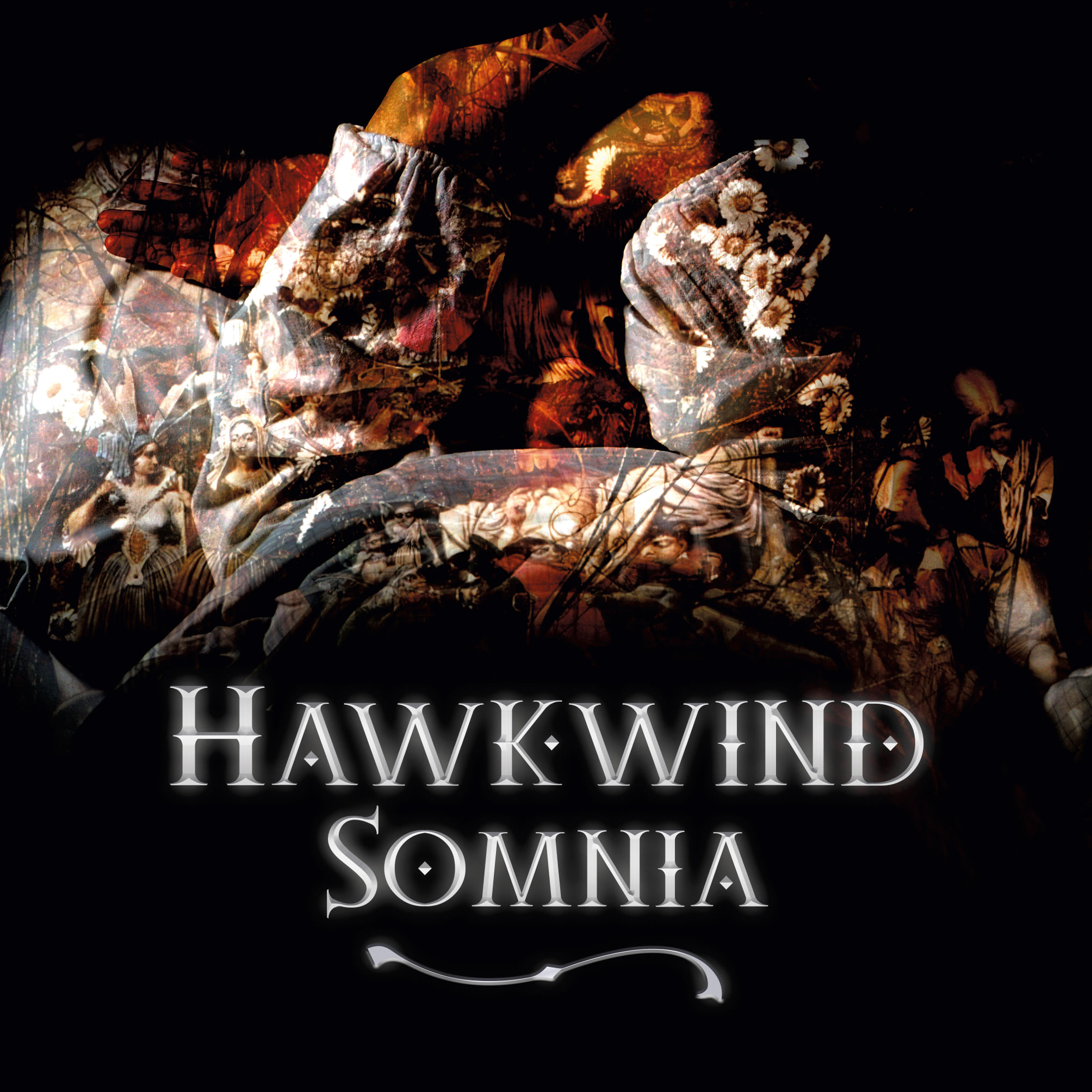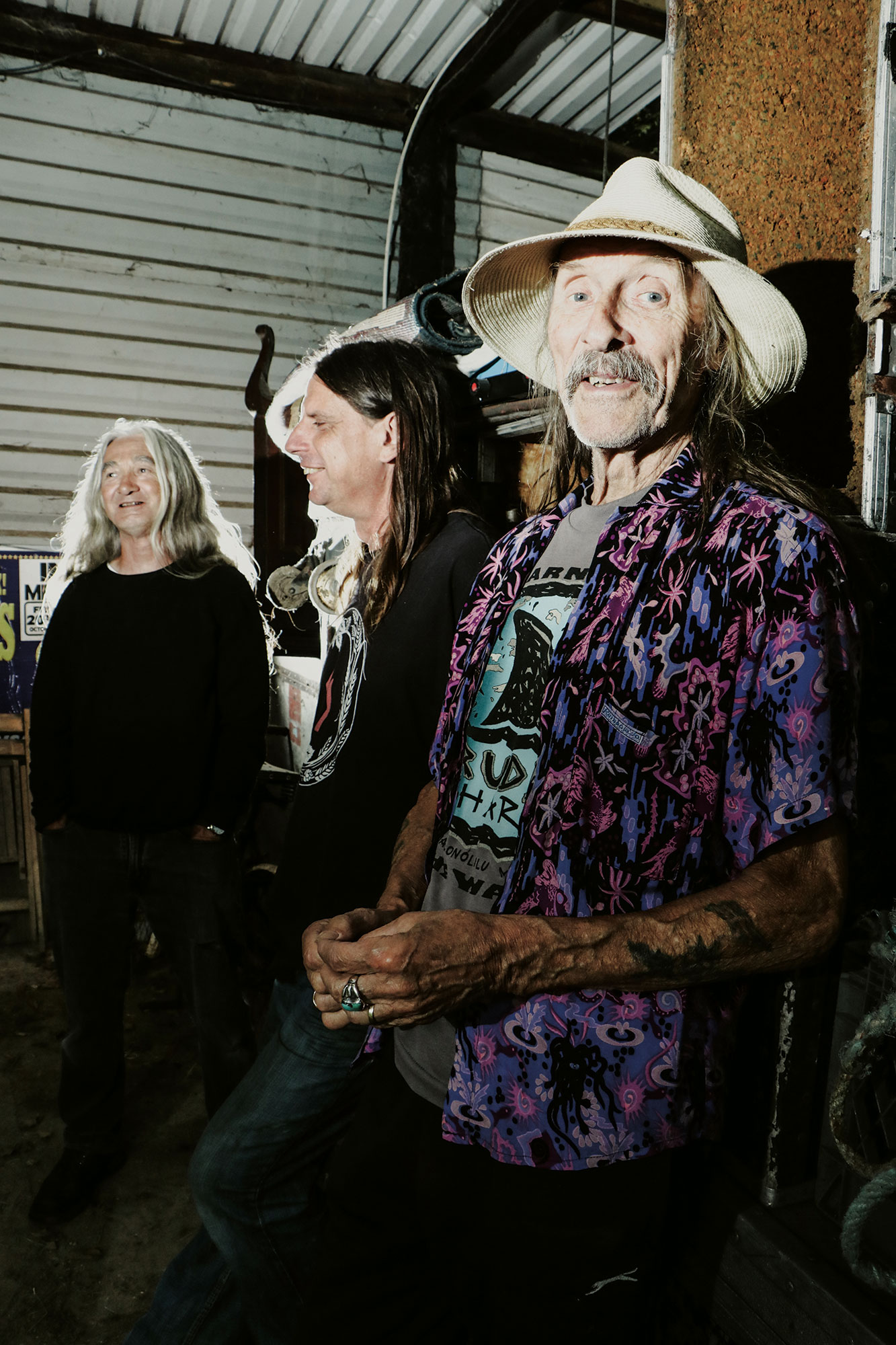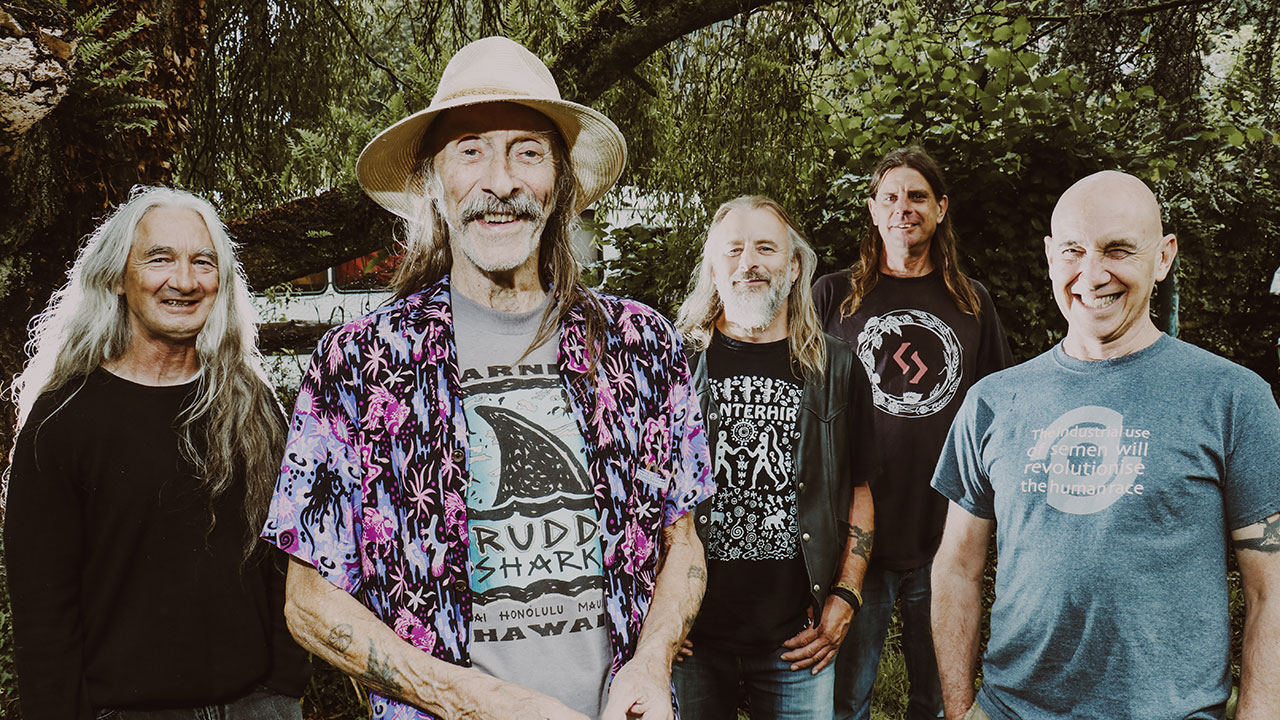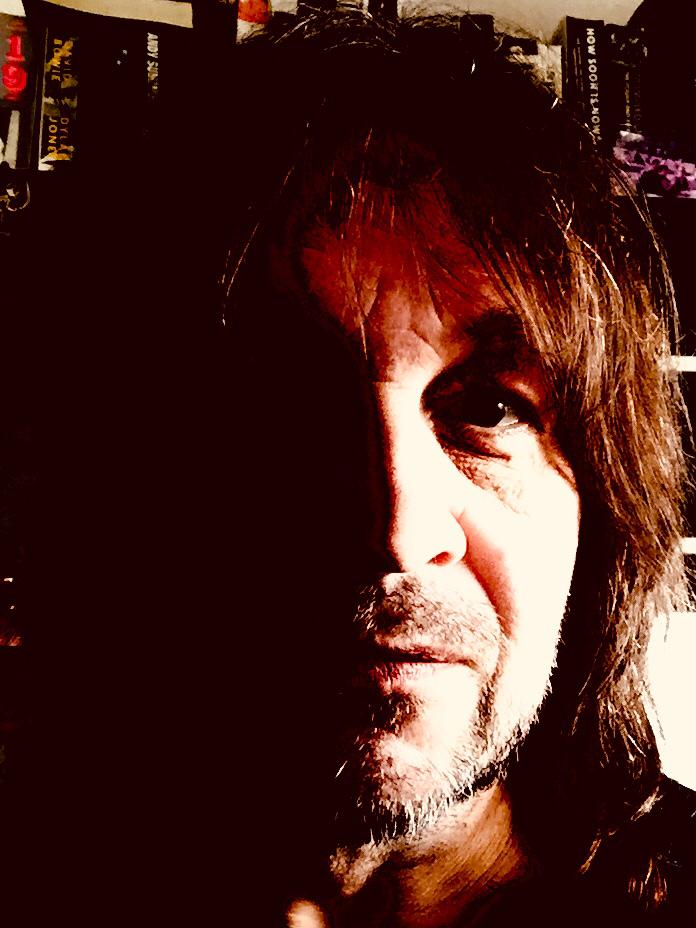It’s not the fact that he turned 80 in August that Dave Brock is lamenting. No, it’s what passed for his birthday celebrations that’s causing much rolling of the eyes.
“Where we live on our farm, the water trough had a terrible leak the night before,” says Brock with a big sigh. “I couldn’t fix it and got soaking wet, and so the first thing on that Friday morning I had to go up there and cut a holly tree down. I then cut the roots off because the actual pipe had got ingrained in the roots. It took me three hours to do on my own!”
Admittedly, such physical activity isn’t the best way to celebrate a milestone event, but surely Hawkwind’s much anticipated return to live action duties at the Beautiful Days festival in Devon later the same day would’ve helped lift his birthday spirits? Apparently not – the endless sawing had left his fretting arm in pain while the onstage sound left plenty to be desired.
“It was rather a forgetful birthday!” chuckles Brock.
Whatever the shortcomings of his special day, neither Dave Brock nor Hawkwind – the space rock pioneers he formed in 1969 – are showing any signs of slowing down. Indeed, as evidenced by the release of the band’s 34th studio album, Somnia, Hawkwind are still deep within the purple patch that kicked off with 2017’s Into The Woods and ran through 2020’s Carnivorous (released under the Hawkwind Light Orchestra banner). A concept album of sorts that deals with sleep, dream states and the kind of dreams that are broken on the rocks of real life, Somnia finds Hawkwind on mighty form as they reaffirm the genre they helped kick off (see China Blues and Strange Encounters), nods to their former contemporaries such as Neu! and Can (Unsomnia) while taking beautiful acoustic diversions (Meditation and Alcyone). So how did the concept originate?
“It partly came out of intense lockdown dreams,” says Brock. “I was having dreams of playing live, which is quite weird because I’ve not had dreams like that before. The psychology behind it was that you were dreaming of these things that happened in the past that actually come through when you’re sleeping.”
He continues: “For Unsomnia, Magnus Martin [guitars/keys/vocals] had this idea of recording that track and then we thought, ‘Yeah, let’s do an album about sleep’, which is quite interesting. That’s what Cave Of Phantom Dreams is about. There’s a vast amount of stuff you can write about and we got all these ideas together and started recording them.”

In common with many musicians, Brock found himself in an artistic state of suspended animation during the initial lockdown. With his guitars gathering dust, he was rather enjoying his newly found domesticity.
“I ended up doing loads of gardening and painting the house and painting the walls and doing chores,” he admits. “I found it really quite relaxing and quite fun!” So how did he pull himself out of his creative torpor?
“It was quite strange, that,” muses Brock. “I had to force myself to start practising the guitar again. It was an unusual experience and I then started thinking, ‘I must start practising again every day.’ You know, you start and then you stop for a few days. I ended doing guitar lessons on our web page, which probably got me going again. Every month I’d do a guitar lesson and show people how to play different Hawkwind songs as well as a bit of blues, and how to make a bottleneck for a guitar and we stuck those up on our website. That was quite constructive.”
Released under the banner of Hawkwind Light Orchestra on account of it starting life as a Dave Brock solo album, last year’s Carnivorous became a steep learning curve for Brock, Magnus Martin and drummer Richard Chadwick as they recorded their parts separately during lockdown and exchanged the files via the internet before finally mixing the album. With that experience under their belts, Hawkwind have fashioned Somnia under similar circumstances, although the sonic results are far smoother and with a greater focus on production than its predecessor enjoyed.
“It sounds better because we had more time to do it and we were more actively involved,” says Brock. The band, he reveals, still exchanged music files when necessary, but they also benefitted from being able to meet up in person for occasional recording sessions and the final mix.
Though the methodology of recording under extraordinary circumstances constitutes new ground for Hawkwind, it’s a continuation of the band’s consistent harnessing of technology that’s been part of their oeuvre since the very beginning. Lest we forget – and as if we could – Hawkwind’s use of light shows, oscillators and album packaging were not only ahead of the pack with only Pink Floyd as serious competition, they also created a hermetically sealed and fully realised multimedia universe that straddled a variety of platforms.
“The attraction with technology is that you can play every instrument going!” enthuses Brock. “I think in the 90s I had guitar MIDI’d so I could play the keyboards through my guitar.”
Explaining his ongoing and enduring passion for technology, Brock reveals that he’s always viewed it to be as much an instrument as his guitars.
“I mean, going back to when we first got a VCS3 synthesiser and making noises on that, and then you could play on arpeggiators,” he recalls. “I had a suitcase version of one and I didn’t realise they go for so much money now, but I used to play arpeggiators on the little keyboard and all that stuff that we used in ’72. You know, we had DikMik on the audio generator and Del Dettmar on his VCS3. Then we didn’t really have a clue what to do. I remember Michael Moorcock saying, ‘You’re just like barbarians with new toys!’
“It took me a long time to learn how to use a computer. It’s like a guitar; you can never stop learning because there’s so much stuff on there that you can play. You could write a whole orchestral piece.”

Bizarrely, the meeting of technology and Hawkwind’s psychedelic ethos
has transposed itself to the Silicon Valley of late with stories emerging of software engineers microdosing with small amounts of LSD. This, they claim, is enabling them to tackle hurdles both at work and in their personal lives. Similarly, tentative studies are being made into the use of psilocybin – the active compound found in magic mushrooms – as a means of overcoming depression, PTSD and alcoholism. Given his own experiences of third-eye bleaching, does Brock think that a psychedelic renaissance is overdue?
“Well, it could be,” he considers. “I suppose that people have constantly dabbled. In the late 60s, it changed a whole culture – music, lighting, books, the whole sort of structure of art and painting. Everything got changed because loads of people were taking LSD. I mean, prior to that, lots of artists used to take psilocybin and magic mushrooms to get their crystalline pictures and we all know how they managed to do that!
“The way things are going, maybe psychedelics could be a good thing. It’s a doom-laden world at the moment.”
For the Brock of today, there are caveats: “All these things, of course, you have
to take within reason. Taking LSD for the first time was like a religious experience. All these things, like mescaline, were taken by tribes, but they were taken as part of very careful religious and controlled experiences, so if anybody freaked out there would be help there. That was the difference, I think, but maybe now not so.”
Of course, he’s right; times and attitudes change and what might have worked decades ago could well have mutated into something else. Take, for example, the fact that someone so anti-establishment as Hawkwind are set to play the London Palladium once again in circumstances far different from when Brock first encountered the celebrated venue.
“I used to busk the queue outside the Palladium and got arrested there! The police told us to move on and we went around the corner, but as soon as they were gone we were back and carried on. They arrested me for public nuisance.”
He laughs and adds: “And next to the Palladium, that’s where the court was and it’s now a hotel. The funny thing is, we played the Palladium and then checked into the hotel and I thought, ‘How strange is this?’ The place where I was charged for being a public nuisance is now a hotel!”
But if the times are changing and becoming more accommodating for his one-time band of sonic outlaws, Brock still maintains a healthy respect for those few bands that operated within Hawkwind’s orbit back in the 1970s. So much so, that he’s hoping to bring together a mouthwatering bill of his fellow pioneers.
“Last year we very nearly did a Hawkfest with [Neu!’s] Michael Rother,” he reveals. “He was going to come over from Germany and of course we had to cancel it. We’ve still got some things in the pipeline. We were going to have a do at the Wembley Arena, actually, with Tangerine Dream and Michael Rother and it was going to be quite an interesting line-up, really. I think it’s been put back to next year and will happen at one of the equinoxes or solstices. It’ll be a bit special.”
He’s not wrong about that, not least as it’s a period that Brock views with an understandable degree of fondness.
“It really was a lot of fun,” he says. “We were a lot younger and when we toured the States it was really quite unusual to be doing things like that. And as you progress through the years you get a bit used to touring. You look back at good shows and you think, ‘Wow, we really got that one together.’”
Yet for all that, Dave Brock is very much grounded in the here and now. Though he freely acknowledges that Hawkwind’s heyday of the 1970s is the area that most people will turn to and reference, he refuses to see himself as being in competition with his former self.
“I just carry on doing what we’re doing, really,” he says. “I mean, it’s really good karma at the moment: I’ve got a great band and it’s great to be playing together again. If you’ve got a good band and it’s fun and everybody gets on with each other, then it’s fun to do; that’s the whole object of having a band.”
With no little understatement, he adds: “The art of good writing is having good melody lines, and if you’ve got a good melody line and a repetitious rhythm section then you’re ready to go!”
This article originally appeared in issue 124 of Prog Magazine.

